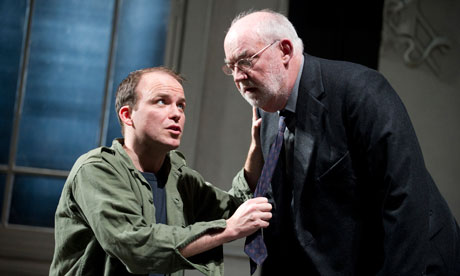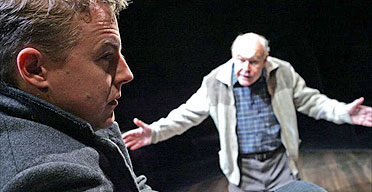It has one of the best closet scenes ever: with Clare Higgins as a raunchy, bibulous Gertrude dishevelling into a tousled heap of wretchedness. It has ridiculous T-shirts (with a smiley face and 'Villain' written on them ) which everyone has to wear, and an ill-advised supermarket trolley which Ruth Negga's glowing Ophelia is lumbered with pushing around when she loses her wits. It has in James Laurenson an unforgettable Ghost, who appears ashen and glittering-eyed out of the grey palace walls, and vanishes back into them as if he were one of the ornamental swags. And it has a caustic, exact, gimlet-sharp prince: Rory Kinnear has confirmed his place in the front rank of British actors.
Nicholas Hytner's production of Hamlet has so much tumbling through it that it goes in and out of focus, combining the ingenious with the idiotic, the thrilling with the flashy. Elsinore is a surveillance state bristling with microphones, busy with spies slipping around corners. An adder-like Patrick Malahide delivers Claudius's opening speech as a politician's television address to the nation: when he's finished, Higgins, who has been holding his hand with a fixed smile, gives a gasp of relief and reaches for a glass of bubbly. The distraught Ophelia is bundled away by palace thugs: it looks as if that aslant willow was just a cover story for a hit job. Which makes sense. Kinnear is always peering through windows as if spying on his own life.
Some of Hytner's innovations are effects rather than ideas (the T-shirts should go), but there are genuine repointings of lines. As Polonius, David Calder wonderfully rearticulates his precepts speech, shifting register when he comes to "thine own self be true", so that his children suddenly stop sniggering. For once, the line is truly wired into the play's darker uncertainties.
Calder was one of the heroes of press night, battling on although his usually resonant voice had been made foggy by acute laryngitis: when Hamlet stabbed him in the throat, it seemed a particularly shrewd blow. Kinnear is the hero of the production: he has plotted a path through the thickets of soliloquies which takes him from angry disgust to a kind of resignation. He begins buttoned-up and damped-down in a dark suit – looking as if his arms are pinioned to his sides, as if he can't move freely because everything hurts. He moves through a carefully orchestrated series of antics (during which he drops his trousers in front of the court). He is at the finish just slightly more open, on the other side of explosiveness. A touch more thawing and dissolving would – perhaps will – make him more moving, but the delicacy of his reserve has its own resonance. He doesn't so much deliver as let fall the beautiful, desolating "how ill all's here about my heart".
A Number multiplies its strengths over the years. When it was first seen at the Royal Court eight years ago, Caryl Churchill's play looked abrasively innovative: its subject is cloning. Now it seems not merely topical but increasingly urgent, and theatrical from top to toe. The stage is the perfect arena to look at likeness and difference: at what makes a character. There are no special effects which can miraculously render someone unrecognisable, magicking them into another creature. And in the tight space of Churchill's drama, with its lean cast of two, there is nowhere to hide.
A man meets his sons and tells them that they are clones: three of many who are rocketing around the place. Those three are played by Samuel West, who first programmed the play four years ago in Sheffield, drawn to it in part by the chance of playing opposite his real-life father, Timothy. It is perfect casting. West Jr slips between bewildered chap, feral youth and easy-going young man, shrugging on two changes of coat. West Sr, hunched in a cardigan, is only one person, but as he chews at his cheek, fumbles with his explanations, he suggests several lives gliding across his face: a life for each son. Together, the Wests slip in and out of each other's sentences – as if they were vocal clones. Everything in Jonathan Munby's intense, first-rate production is clinical: the ceiling is studded with test tubes; fluorescent light flashes with an electronic buzz. The exchanges between the men are by contrast the more idiosyncratically human.
Hampstead has been in the doldrums; now Edward Hall takes over the theatre most strongly identified with new writing, with an appetising forward schedule but a mediocre inaugural play.
Shelagh Stephenson's Enlightenment is a 21st-century metaphysical mystery: it features a couple whose son has gone missing in the far east at the time of the Bali bombings, and an amnesiac young man who turns up laying claim to his identity. The mystery – an underused theatrical element – grips intermittently. Hall's production is smooth, with some jaunty touches: Daisy Beaumont puts in a sharp portrait of an avid TV journalist (lots of little mobile phone gestures), though she's caricature rather than character. A globalisation/chaos theory theme floats in the ether, like one of the spirit voices produced by a stereotypical medium called in to help. Yet it never propels the action. It's a chic extra layer best conveyed not in dialogue but by Francis O'Connor's design: at the back of an immaculate white drum of a room flit shadows – of young, rucksacked beings and of hands pressing and splaying, as if attempting to come through the wall.
Fausts, not usually thick on the ground, have been proliferating in the past few weeks. First the ENO, then a Radio 3 production (with Samuel West, actually). What is this: some sort of pact? Now Gísli Örn Gardarsson, the Icelandic gymnast who commandeered the stage with his elasticity and upside-down walking in Metamorphosis, has produced a response to Goethe's play which buries its story, and its human implications, in a welter of diabolic high jinks.
The most exciting aspect of this Faust is a massive net strung high above stage and stalls. On this, devils and other reprobates gallivant above the heads of the audience, springing around with a bouncy gait: it's as if their legs were made of rubber and all their action moved to a rhythm quite other than that of ordinary mortals. There are other droll effects: synchronised dance routines for wheelchairs; characters jumping through floorboards on to the stage; a few perky rhyming couplets and some neck-twistings which are accompanied by sickeningly loud clicks. But Nick Cave and Warren Ellis's score is merely a gentle dapple of background music. The most sinister part of the evening came outside the auditorium. The cab driver who spirited me away pointed to his number: 666.











